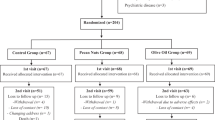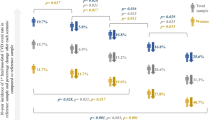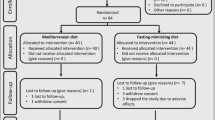Abstract
Objective:
Mediterranean diet is associated with decreased levels of inflammatory markers and metabolic risk factors in epidemiologic studies and recent trials on patients with metabolic syndrome. Given the recent improvements in medical treatments, it is unclear if such beneficial effects are also present in patients with coronary artery disease (CAD). We therefore investigated the effect of Mediterranean diet on markers of inflammation and metabolic risk factors in patients with treated CAD.
Design:
Randomized, controlled trial.
Subjects:
A total of 101 patients (59.4±8.6 years, 23% female) with established and treated CAD (80% statins).
Interventions:
Participants were assigned to a Mediterranean diet group (MG; n=48) with a 1-year program of 100 h of education, or to a written advice-only group (AG; n=53). Before and after intervention, we measured serum high-sensitivity C-reactive protein (hs-CRP), fibrinogen, fasting insulin, homocysteine, serum lipids and plasma fatty acids.
Results:
The Mediterranean diet program increased the intakes of fish, fruits/vegetables and moderately of canola/olive oil and increased plasma concentrations of long-chain n-3 polyunsaturated fatty acids in the MG. Median hs-CRP and mean fibrinogen, homocysteine, fasting insulin, triglycerides and serum cholesterols remained unchanged in both groups.
Conclusions:
Adoption of a Mediterranean diet by patients with medically treated CAD has no effect on markers of inflammation and metabolic risk factors.
Sponsorship:
Alfried Krupp Foundation, Essen, Germany.
This is a preview of subscription content, access via your institution
Access options
Subscribe to this journal
Receive 12 print issues and online access
$259.00 per year
only $21.58 per issue
Buy this article
- Purchase on Springer Link
- Instant access to full article PDF
Prices may be subject to local taxes which are calculated during checkout
Similar content being viewed by others
References
Ascer E, Bertolami MC, Venturinelli ML, Buccheri V, Souza J, Nicolau JC et al. (2004). Atorvastatin reduces proinflammatory markers in hypercholesterolemic patients. Atherosclerosis 177, 161–166.
Bemelmans WJ, Broer J, Feskens EJ, Smit AJ, Muskiet FA, Lefrandt JD et al. (2002). Effect of an increased intake of alpha-linolenic acid and group nutritional education on cardiovascular risk factors: the Mediterranean Alpha-linolenic Enriched Groningen Dietary Intervention (MARGARIN) study. Am J Clin Nutr 75, 221–227.
Benson H, Stuart M (1999). The Wellness Book. Mind–Body Medicine. Fireside: New York.
Chrysohoou C, Panagiotakos DB, Pitsavos C, Das UN, Stefanadis C (2004). Adherence to the Mediterranean diet attenuates inflammation and coagulation process in healthy adults: The ATTICA Study. J Am Coll Cardiol 44, 152–158.
de Lorgeril M, Renaud S, Mamelle N, Salen P, Martin JL, Monjaud I et al. (1994). Mediterranean alpha-linolenic acid-rich diet in secondary prevention of coronary heart disease. Lancet 343, 1454–1459.
de Lorgeril M, Salen P, Martin JL, Monjaud I, Delaye J, Mamelle N (1999). Mediterranean diet, traditional risk factors, and the rate of cardiovascular complications after myocardial infarction: final report of the Lyon Diet Heart Study. Circulation 99, 779–785.
Eckhardt J (2000). Ernährungsanamnese, Beratungs- und Informationssystem auf Grundlage des Bundeslebensmittelschlüssels, BLS II.3.. Universität Hohenheim: Hohenheim.
Esposito K, Marfella R, Ciotola M, Di Palo C, Giugliano F, Giugliano G et al. (2004). Effect of a Mediterranean-style diet on endothelial dysfunction and markers of vascular inflammation in the metabolic syndrome: a randomized trial. JAMA 292, 1440–1446.
Geelen A, Brouwer IA, Schouten EG, Kluft C, Katan MB, Zock PL (2004). Intake of n-3 fatty acids from fish does not lower serum concentrations of C-reactive protein in healthy subjects. Eur J Clin Nutr 58, 1440–1442.
Jula A, Marniemi J, Huupponen R, Virtanen A, Rastas M, Rönnemaa T (2002). Effetcs of diet and simvastatin on serum lipids, insulin, and antioxidants in hypercholesterolemic men. JAMA 287, 598–605.
Koh KK, Son JW, Ahn JY, Jin DK, Kim HS, Choi YM et al. (2004). Vascular effects of diet and statin in hypercholesterolemic patients. Int J Cardiol 95, 185–191.
Kratz M, Cullen P, Kannenberg F, Kassner A, Fobker M, Abuja PM et al. (2002). Effects of dietary fatty acids on the composition and oxidizability of low-density lipoprotein. Eur J Clin Nutr 56, 72–81.
Kris-Etherton P, Eckel RH, Howard BV, St Jeor S, Bazzarre TL (2001). AHA Science Advisory: Lyon Diet Heart Study. Benefits of a Mediterranean-style, National Cholesterol Education Program/American Heart Association Step I Dietary Pattern on Cardiovascular Disease. Circulation 103, 1823–1825.
Kris-Etherton PM, Harris WS, Appel LJ (2002). Fish consumption, fish oil, omega-3 fatty acids, and cardiovascular disease. Circulation 106, 2747–2757.
Lee KW, Lip GY (2003). Effects of lifestyle on hemostasis, fibrinolysis, and platelet reactivity: a systematic review. Arch Intern Med 163, 2368–2392.
Lopez-Garcia E, Schulze MB, Manson JE, Meigs JB, Albert CM, Rifai N et al. (2004). Consumption of (n-3) fatty acids is related to plasma biomarkers of inflammation and endothelial activation in women. J Nutr 134, 1806–1811.
Madsen T, Christensen JH, Blom M, Schmidt EB (2003). The effect of dietary n-3 fatty acids on serum concentrations of C-reactive protein: a dose–response study. Br J Nutr 89, 517–522.
Marckmann P, Bladbjerg EM, Jespersen J (1997). Dietary fish oil (4 g daily) and cardiovascular risk markers in healthy men. Arterioscler Thromb Vasc Biol 17, 3384–3391.
Mori TA, Bao DQ, Burke V, Puddey IB, Watts GF, Beilin LJ (1999). Dietary fish as a major component of a weight-loss diet: effect on serum lipids, glucose, and insulin metabolism in overweight hypertensive subjects. Am J Clin Nutr 70, 817–825.
Ornish D, Brown SE, Scherwitz LW, Billings JH, Armstrong WT, Ports TA et al. (1990). Can lifestyle changes reverse coronary heart disease? The Lifestyle Heart Trial. Lancet 336, 129–133.
Pischon T, Hankinson SE, Hotamisligil GS, Rifai N, Willett WC, Rimm EB (2003). Habitual dietary intake of n-3 and n-6 fatty acids in relation to inflammatory markers among US men and women. Circulation 108, 155–160.
Prochaska JO, Velicer WF (1997). The transtheoretical model of health behavior change. Am J Health Promot 12, 38–48.
Renaud S, de Lorgeril M, Delaye J, Guidollet J, Jacquard F, Mamelle N et al. (1995). Cretan Mediterranean diet for prevention of coronary heart disease. Am J Clin Nutr 61, 1360S–1367S.
Ros E, Nunez I, Perez-Heras A, Serra M, Gilabert R, Casals E et al. (2004). A walnut diet improves endothelial function in hypercholesterolemic subjects: a randomized crossover trial. Circulation 109, 1609–1614.
Siero FW, Broer J, Bemelmans WJ, Meyboom-de Jong BM (2000). Impact of group nutrition education and surplus value of Prochaska-based stage-matched information on health-related cognitions and on Mediterranean nutrition behavior. Health Educ Res 15, 635–647.
Singh RB, Dubnov G, Niaz MA, Ghosh S, Singh R, Rastogi SS et al. (2002). Effect of an Indo-Mediterranean diet on progression of coronary artery disease in high risk patients: a randomised single-blind trial. Lancet 360, 1455–1461.
Thies F, Garry JMC, Yaqoob P, Rerkasem K, Williams J, Shearman CP et al. (2003). Association of n-3 polyunsaturated fatty acids with stability of atherosclerotic plaques: a randomised controlled trial. Lancet 361, 477–485.
Yancy WS, Westman EC, French PA, Califf RM (2003). Diets and clinical coronary events. The truth is out there. Circulation 107, 10–16.
Acknowledgements
The study was supported by a grant from the Alfried Krupp von Bohlen und Halbach Foundation, Essen, Germany.
Author information
Authors and Affiliations
Corresponding author
Additional information
Guarantor: A Michalsen.
Contributors: AM, NL, SM, TB, GD designed the study. AM wrote the original manuscript. AM and NK coordinated the trial. SM and NK were responsible for quality control. NL and SM performed the statistical calculations and analyses. CP was the dietitian and mainly responsible for collection of data. LB and FK analysed all blood samples. All authors contributed to interpretation of data and critically revised the manuscript.
Rights and permissions
About this article
Cite this article
Michalsen, A., Lehmann, N., Pithan, C. et al. Mediterranean diet has no effect on markers of inflammation and metabolic risk factors in patients with coronary artery disease. Eur J Clin Nutr 60, 478–485 (2006). https://doi.org/10.1038/sj.ejcn.1602340
Received:
Revised:
Accepted:
Published:
Issue Date:
DOI: https://doi.org/10.1038/sj.ejcn.1602340
Keywords
This article is cited by
-
The effect of three different ad libitum diets for weight loss maintenance: a randomized 18-month trial
European Journal of Nutrition (2017)
-
Sex differences in the impact of the Mediterranean diet on systemic inflammation
Nutrition Journal (2015)
-
Dietary intake and plasma concentrations of PUFA and LC-PUFA in breastfed and formula fed infants under real-life conditions
European Journal of Nutrition (2010)
-
Components of the mediterranean-type food pattern and serum inflammatory markers among patients at high risk for cardiovascular disease
European Journal of Clinical Nutrition (2008)
-
Effect of a moderately hypoenergetic Mediterranean diet and exercise program on body cell mass and cardiovascular risk factors in obese women
European Journal of Clinical Nutrition (2008)



